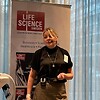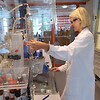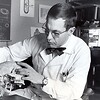-

ALS – When the body has given up, but the brain persists
The nerve disease ALS gradually deprives the patient of control over the muscles and, eventually, also of speech. The eyes continue to function, though, and with the help of, among other things, a Swedish-developed invention, communication with the outside world can continue. “It’s their window to the world,” says ALS researcher Caroline Ingre.
-

The stomach medication that became the biggest blockbuster of the 1990s
The omeprazole molecule was synthesised as early as 1979, but it took many years before the then Astra had an approved pharmaceutical. Once this happened, a tablet was available that was soon to help millions of people worldwide and break all sales records.
-

Swedish breakthrough in Alzheimer’s: “We can finally present great data”
Treatments for Alzheimer’s disease are currently among the hottest topics in drug development. Two Swedish research companies with high ambitions and successes in the field participated in Bioscience 2022 conference at Life City in Hagastaden, Stockholm.
-

Neanderthal genes and Nobel Prize in a popular lecture at Bioscience
An inherited gene variant from our ”evolutionary cousins” – the extinct Neanderthals – may affect how our bodies break down certain drugs. “It’s only a matter of time before we actively start screening for it,” said KI researcher Hugo Zeberg when
-

Jätteregister ska ge bättre mammografi: "AI kommer att vara en fantastiskt arbetskollega"
Ett digitalt bildarkiv med över en halv miljon mammografier tagna i Malmö ska utmana artificiell intelligens, AI, att upptäcka bröstcancer i ett tidigare skede. Men inte för att ersätta röntgenläkarnas mänskliga bedömning, utan för att komplettera den.
-

A green nursery for biotech rooted in the Scanian soil
Red Glead has established itself as one of Lund’s largest companies in pharmaceutical development. Life Science Sweden went to Skåne and met two of the founders, Johan Evenäs and Martina Kvist Reimer.
-

“We aim to be a start-up company with an academic spirit”
Chronic pain and Alzheimer’s are two diseases that plague many people worldwide and seem impossible to cure. However, Huddinge-based company Alzecure is working on developing drugs for both conditions.
-

Promising Alzheimer’s study data sends Bioarctic stock soaring
The drug candidate lecanemab from Swedish company Bioarctic significantly slowed down the deterioration in patients with early on-set Alzheimer’s, according to preliminary results from a phase III study.
-
Laskerpriset går till forskare bakom realtidsövervakning av covid-19
Hela världen har kunnat följa smittspridningen av covid-19 i realtid. Nu får Lauren Gardner Årets Laskerpris för att ha gjort det möjligt.
-

Bought a tablet factory – and built his own empire
In 1995, Thomas Eldered was CEO of one of Pharmacia’s factories in the Stockholm area when the Swedish pharmaceutical giant, after a takeover, decided to move its production abroad. 34-year-old Thomas was facing an imminent risk of losing his job. However, instead, it actually turned out to be the starting point for one of the biggest success stories in Swedish life science.
-

Genes from Neanderthals can affect the correct drug dosage
A fifth of all Europeans carry gene variants inherited from Neanderthals, which cause certain drugs to break down more slowly. This may have implications for the drug doses they should take.
-

When carelessness, forgetfulness and coincidence become the researcher’s best friend
Forgetfulness, coincidence and a stroke of luck hardly make up a fruitful method of serious research. Or do they? Actually, a number of important medical advances have come about thanks to completely random incidents and the open-mindedness of scientists who were ready to think outside the box.
-

Björn Ursing: Physicians new role in AI driven healthcare
”AI could be the key we need for tomorrow’s healthcare, but it is not a stand-alone tool”, writes Björn Ursing in a column about how the role for physicians changes in the era of AI.
-

The route to vaccines for everyone: “We did not just sit around and wait”
The pandemic was in full swing, and no one knew when or even if a vaccine would come. At that point, the Swedish Minister of Social Affairs called with a proposal, and Richard Bergström did not hesitate. “I already had a notion that this would work,” he says in an interview with Life Science Sweden.
Få tillgång till allt innehåll på Life Science Sweden
Ingen bindningstid eller kortinformation krävs
Redan prenumerant? Logga in
Gäller endast personlig prenumeration.
Kontakta oss för en företagslösning.